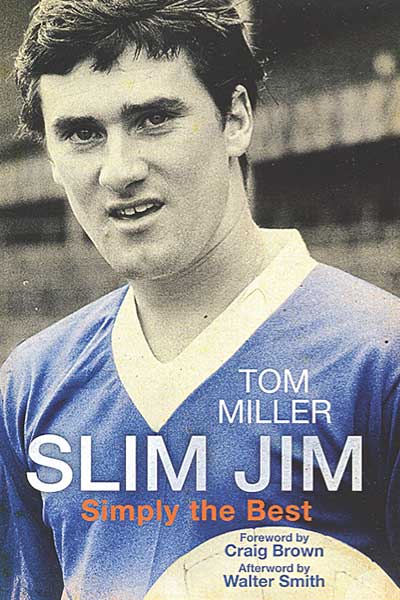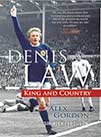Taking time out from pondering which footballer’s haircut to get at the barbers’, magazine editor Andy Lyons, writer Harry Pearson and host Daniel Gray discuss Representative XIs, B-Teams and C-Teams, from Jim Baxter versus the Nordics to Great Britain taking on Europe, via a flat share with Jimmy Hill. WSC Assistant Editor Ffion Thomas delves into the pages of magazine issue 418, Record Breakers brings rhymes from Reims, and we continue our nearly-new feature, The Final Third, in which a guest contributes a match, a player and an object to the WSC Museum of Football. Joining Dan as our visiting curator this time is comedian and radio presenter, Charlie Baker, who also discusses falling for the Vanarama and being the son of a man with an advertising hoarding at a Football League ground.
Search: 'Jim Baxter'
Stories
A failed World Cup, underdogs having their day and free drinks during VAR decisions – WSC contributors on what they are wishing to see in the coming year
There was a time when strike partnerships rolled off the tongue like superheroes and clubs even thought foreign players should be kept in pairs, as Harry Pearson explains
 Simply the best
Simply the best
by Tom Miller
Black & White, £9.99
Reviewed by Gordon Cairns
From WSC 337 March 2015
The radio football parody Only An Excuse captured the Scottish perception of Jim Baxter almost to perfection back in the 1980s. His character explains his most famous performance, against England in 1967 where at one point he juggled with the ball: “I had a couple of great teachers… and three White & Mackays and a double Grouse, before I went on the pitch, like. That would explain the languid fluidity.” Unfortunately, the only inaccuracy was the choice of spirit – Baxter preferred Bacardi over whisky. Tom Miller tries to expand on the popular caricature of an incredible footballer who loved a drink by offering an explanation for Baxter’s self-destruction in this new biography, with somewhat limited results.
James Curran Baxter is often described as Scotland’s greatest player but ended a 12-year playing career with only ten domestic medals, which was not a lot given that Rangers were the dominant team in Scotland for most of his time at Ibrox. Perhaps that is why his eulogists focus on individual performances, including two victories at Wembley and being picked for a Rest of the World select. However the extent of Baxter’s drinking and lack of training must surely limit claims that he was truly world class. Although alcohol abuse was rife in the football culture of the 1960s, it’s questionable whether you can consistently operate at the top level with high volumes of alcohol in your bloodstream – Pelé and Eusébio weren’t playing with hangovers.
It seems Baxter’s problem was that he simply didn’t value the natural ability that raised him out of the ordinary, his career a long attempt at sabotaging the skill he possessed. In the most interesting chapter, sports psychologist Tom Lucas examines how never being acknowledged by his birth parents as their son during his playing career may have affected Baxter. (He grew up thinking his real mother was his aunt, who he was raised by.) Lucas’s conjecture is that the pitch was the only place Baxter could escape from the pain of rejection by his mother while his womanising could be connected to his feelings of abandonment.
Published two years after what was billed as “the definitive biography”, the bulk of this book rehashes the well-worn tales of Baxter’s drinking, gambling and occasional footballing. Miller, an in-house commentator for Rangers, didn’t have to wander far in his choice of interviewees, the majority of whom seem to come from the club’s “family”, including current defender Darren McGregor and youth-team coach Davie Kirkwood, I assume because both had played for Fife clubs like Baxter, hardly justifying their inclusion. Baxter’s own voice is barely heard, yet for most of his playing career he wrote syndicated columns. Although ghost-written, surely a trawl through these would have unearthed something more relevant than how McGregor felt when he joined Rangers.
The inclusion of two poems and a selection of pen portraits from the back of football cards feel like fillers to make the book up to the required length. There is no interview with Alex Ferguson, who played alongside Baxter; Scotland’s greatest manager’s views on getting the best from Scotland’s most talented player would have been compelling. Neither is there any input from Baxter’s sons or first wife, which could have given greater insight into how he felt about family, especially if he had issues about abandonment.
 King and country
King and country
by Alex Gordon
Arena, £17.99
Reviewed by Archie MacGregor
From WSC 323 January 2014
It’s easy to understand why Denis Law was, and still is, idolised by so many Scotland fans. As this chronicle of his international career reminds us, he just loved pulling on the navy blue jersey. There’s a palpable sense that he was just as excited and proud about his last cap – in Scotland’s opening 1974 World Cup group match against Zaire – as he was when he made his debut against Wales in 1958.
He could play a bit too, which helped of course. Law remains, alongside Kenny Dalglish, his country’s record goalscorer with 30 to his name. Twice he scored four goals in a game and he put a few in the back of the net against England. No doubting the iconic status of “the Lawman” then, but the trouble is this book just about goes right off the scale with the adulation. Superlatives are served up by the trowel – there’s just about a different one for every goal that Law scored in his entire senior career and he got 325 of them. So it’s not only the constant references to games from the Home Internationals and Scotland appearing in World Cup finals that evoke a bygone age. In an era where the warts-and-all biography laden with tales of compulsive behaviour disorders and dysfunctional relationships within dressing rooms is now the accepted norm you are left craving more gritty insight.
While the idiosyncratic Aberdonian seems nothing other than a down-to-earth type there are still a few aspects of his international career that would surely have justified some considered scrutiny. It’s widely accepted that spanning the 1960s the Scotland team, blessed with talents such as Law, Jim Baxter, Jimmy Johnstone and others, underperformed by quite a margin in World Cup and European Championship qualifiers, failing to reach the finals of either between 1958 and 1974. Just how much did the obsession with giving the English a right doing, personified by Law, distort and distract the national side’s focus?
Even when Law was part of the squad that was taken to the 1974 finals there was a fair bit of hullabaloo about his inclusion which is only lightly dwelt upon here. It’s pointed out that then manager Willie Ormond robustly defended the decision – however the fact that he was immediately dropped after the Zaire opener is surely a pointer that this was an issue worthy of more thoughtful examination. The trials and frustrations that Law faced with his lengthy injury woes and loss of form from 1967 onwards is another facet barely touched on.
Still, if as a kid like me you went around parading the trademark clenched cuff salute every time you scored a goal in the playground, there is probably more than enough here for you to enjoy wallowing in the nostalgia. It’s just a shame we don’t learn as much about Law the enigma as Law the legend.